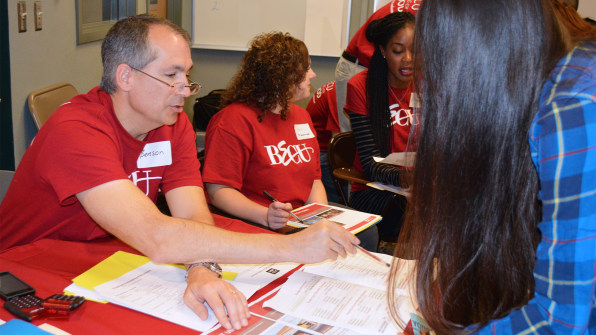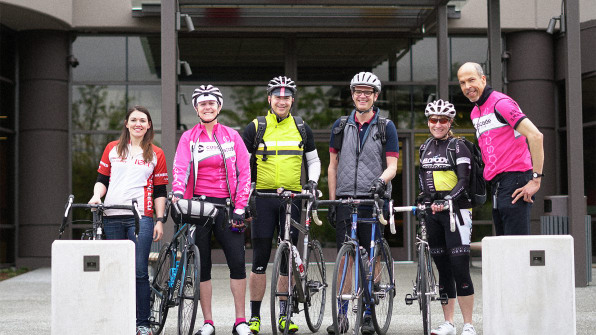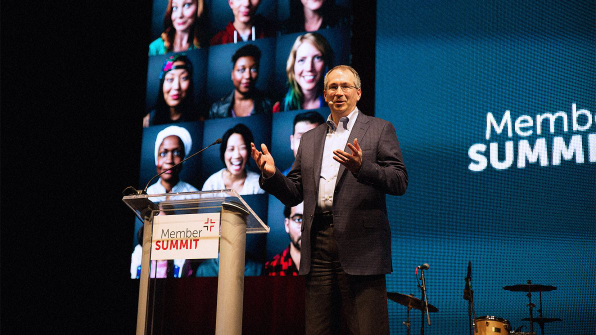For This Customer-Owned Bank, Breakthrough Products Originate From Empathy
“Promoting savings is one of our core values” says Benson Porter who took over as CEO of the credit union BECU in 2012—77 years after the member-owned financial cooperative was formed.
As a banker, Porter says, you hear plenty of stories about people who do everything right in handling their finances “but then something happens–a medical condition or a spouse dies prematurely. That puts them on a downward spiral.” In these situations, your savings can be a crucial buffer. But banks typically pay their highest interest rate to the depositors that give them the most money, upwards of $100,000, “That makes it hard to motivate people living paycheck-to-paycheck to put money in a savings accounts, especially with the low interest rate environment we’ve been in.” (He cites a report that found 43% of Americans can’t afford a $400 emergency expense.)
So Porter and BECU have flipped that model, “We pay our highest interest rate on the first $500 in deposit from our members, whether it’s kids or adults, to show them the benefit of savings.” The 6% interest rate that BECU offers is incredibly rare in today’s historically low interest rates, and it incentivizes its members to start saving. Last year, the credit union returned $174 million to its members (or $180 per member) in the form of better rates and lower fees, Porter points out.
He credits the innovation with making them the “preferred piggy bank for kids in the Puget Sound because we have over 90,000 of these early saver accounts, and I think it’s popular with parents and the kids because they actually can see their money grow.” The credit union, which began as an institution for Boeing’s employees and their families, has since expanded its membership to those who live and work in Washington state (changing their name from Boeing Employees’ Credit Union to BECU in 2004 to better reflect their membership).
Under Porter’s leadership, BECU has also applied the same customer focused thinking to its lending products. “When our members make good financial decisions over the year and their credit score improves, we automatically lower the interest rate on their consumer loans.” As part of a program, which is unique to BECU, he reports that last year the credit union’s members “saw an automatic decrease in their interest rate that saved them $2.7 million dollars in interest charges.”
In many ways, BECU’s approach is summed up in its tagline, “more than just money” which is directly counter to how big banks operate. Unlike most large banks that no longer hold their own mortgages, selling them into the secondary market (trading activity in that market turned out to be a major reason for the financial collapse in 2008), he says, “we hold many of our mortgages in portfolio which gives us almost complete ability to modify a loan. The difference for BECU is that we own it, we hold the servicing and so we’re able to make that decision.”
Its keen focus on listening to its customers explains why the credit union has grown to more than 1 million members, to become the fourth largest in the U.S. They are driving innovation in the financial services industry in large part by doing so, and uncovering new opportunities to develop some of their most successful products.

Relationships, Not Returns
“Banks struggle to serve because their focus is on profit,” says Porter. “Community banking allows them to not treat people as just numbers.” Unlike a bank, a credit union is a member organization and its owners are also its customers. This avoids the conflict that banks face in meeting the needs of their customers versus its shareholders. Porter says he has only one boss–his customers, and that informs how the credit union measures its performance.
“Our metrics are not at all related to financial return,” he says. “All of our employees across our organization have member experience as part of their performance goals. This makes us different from for-profit banks that look to sell more products to their customers each year. We don’t look at it that way.”
Instead, BECU uses the net promoter score to measure their success. It’s a measure, now used widely in the market, that simply asks customers if they would refer a friend or family member to their business. Porter says BECU’s score is more than double the banking average; 70% of BECU’s customers report they would refer it to their friends, versus an average of 35% for banks nationally.
For Porter, it is important as CEO to really get out and meet members. Every month he personally reaches out to “our members who are first time home buyers or are celebrating a long term anniversary as a member of the credit union, and I’ll give them a call.” Though he admits many of these calls end up in voicemail, he shares a time when he reached a young woman’s cell phone. “She happened to be at Home Depot in the process of buying paint, to go paint a wall in a new condo, that she’d just purchased with a loan from us. It was just great. I mean, she was so happy.”

CEO As Chief Culture Officer
Porter invests similar time with his employees understanding and building empathy for the work they do. “I go to the contact center, sit down with one of our customer service reps, and listen to calls. When you sit in their shoes and see all the screens they have to go through in order to serve our members… it’s helped lead us to new initiatives as we try to improve those experiences.”
BECU also hosts an annual meeting with their members, which is billed as their “members’ summit”, where members can sign-up to educate themselves on topics like retirement planning or buying their first home, and members can also ask BECU’s executive team their questions on any topic.
While Porter says he is confident their “members love BECU.” He still wonders “if we will lose the magic sauce as we grow. Can you still have the same culture, the same employee experience as you grow?”
As a result, he views his role as the credit union’s chief culture officer to keep their community focused culture alive. This more than anything else informs his leadership approach including the hiring decisions they make as they grow, “The vast majority of people we hire to BECU come from other service organizations because we want to target people who like serving. We generally don’t hire people from other financial institutions unless it’s a particular skill set gap that we’re trying to fill. We generally hire from great service organizations like Nordstrom’s and Starbucks and others, and we’re fortunate to have so many of these organizations, here in the northwest, that we can find talent from.”
Cash-Free Branches
BECU has relatively few physical branches and the majority have no money on site. Instead of tellers, its neighborhood financial centers have member consultants who provide one-on-one support for opening accounts and lending services. This was the result of a major push to invest in ATMs, online, and mobile banking, after Porter came on board as CEO. He says, “People want to be able to bank wherever they are 24/7.”
Porter recalls being so excited when the credit union rolled out its new mobile application. “We had done everything. And I thought this is going to be great.” But the product was not as well received by their members, “It was in the app store rated two stars.” So he began to engage with his members to get their input and turn it around, and discovered that they had let the technology lead the way instead of designing the app to their members’ needs. For Porter, this was an important reminder of the value of listening to their customers, “We don’t want to lead them farther than they want to go. And sometimes technology will do that to you.”
The feedback led to nine releases over the next 12 months. As a result, “It’s now a five-star-rated app, one of the top in the app stores for any bank in the country, and to us it’s the example we use around here, to go where the puck is going to go–but then we also listen to our members to make sure we do it in a way that they appreciate.”

Importance of Storytelling
For Porter, the culture and success of BECU lies in stories. “We can share facts and figures about our performance and growth, but I don’t think they reflect our values like a story does.” He is regularly telling stories and soliciting them from both his employees and their members.
“I think the story we probably tell the most is about how BECU came into being.” The credit union was founded by 18 Boeing employees, during the Great Depression when Boeing didn’t supply the tools that new workers needed. At the time small consumer loans weren’t available. “There really wasn’t a source for folks to be able to go out and buy these tools. These eighteen workers had the foresight, after reading an article in the Reader’s Digest about a new cooperative lending concept. They put in 50 cents each, so they had a credit union with assets of nine dollars. Their first loan was a $2.50 tool loan. That’s how we got started. BECU was basically a tool lending cooperative.”
“It’s good to keep reminding people of why were we formed to exist and what we are really about,” he says. “It was people helping people.” That philosophy guides BECU to this day.
This article is part of a series of articles by Aaron Hurst exploring how leaders find purpose and meaning in their jobs. Last fall, Hurst’s company, Imperative, released a global survey of the role of purpose at work, in partnership with LinkedIn Talent Solutions, which found that those who are intrinsically motivated to find purpose in their jobs consistently outperform their colleagues and experience greater levels of job satisfaction and well-being, regardless of country, gender, or ethnicity. They are also 50% more likely to be leaders. This series will profile those leaders, and how they connect with what’s meaningful to them in their role and the organizations they lead.
Corrections: We’ve updated this article to reflect that BECU has 1 million members, and that its net promoter score is 70%, not 35%.
Benson Porter, CEO of credit union BECU, says things are different when your customers are also your boss.
“Promoting savings is one of our core values” says Benson Porter who took over as CEO of the credit union BECU in 2012—77 years after the member-owned financial cooperative.
Fast Company , Read Full Story
(14)



